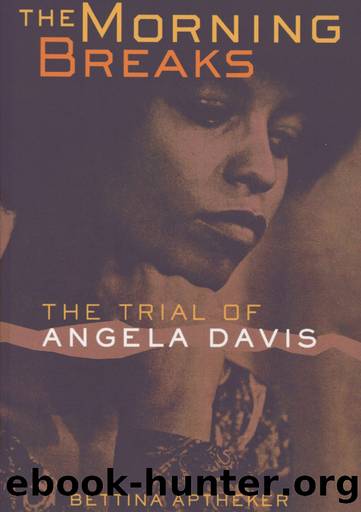The Morning Breaks by Bettina Aptheker

Author:Bettina Aptheker [Aptheker, Bettina]
Language: eng
Format: epub
ISBN: 9780801485978
Barnesnoble:
Publisher: Cornell University Press
Published: 1999-05-15T00:00:00+00:00
15
Friday, February 18, 1972. New York City. 11 A.M. Kendra, Franklin and I were sitting with the California delegation to the Twentieth Convention of the Communist Party. The convention was being held at the Towers Hotel in downtown Brooklyn. We were listening to the debate on the main resolution presented the day before. There were well over 1,000 delegates, observers and guests. The atmosphere was typically âconventionââmuch activity, groups in the rear of the hall, whispered conversations in sundry corners, papers rustling, constant streams of people walking in apparently random motion.
Charlene Mitchell burst into the room, wove her way through the bustling throng, and over to our table. She extended both arms around all three of us, and whispered: âHoward just called. The California Supreme Court will abolish the death penalty at noon today, California time.â She didnât say anything else for a few moments. We all sat there stunned. Slowly, very slowly, my brain unravelled the import of this announcement. Kendraâs eyes flooded with tears. She seemed overwhelmed, unable to remain seated. She started pacing, working her hands, repeating softly, in ecstasy and disbelief, âOh my God! Oh my God!â
The implications of the decision for Angelaâs case were manifold. The most immediate and obvious fact, the cause for over-whelming psychological relief, was that there was no longer any possibility of a death sentence should there be a conviction. We had almost never spoken of thatâexcept once, Angela and I had discussed it briefly. It was one of those horrifying realities, contemplated in the sub-conscious realm of the nightmare, never to be articulated.
The decision would also mean that our prospective jurors could not be asked their opinion of the death penalty during the voir dire examination. Many a progressive-minded individual had been dismissed from a jury panel in a capital case in the past, for expressing opposition to the death penalty. We had a chance for a better jury. It was, as Howard jubilantly declared, âa whole new ball-game.â
And then, finally, in the recesses of my mind, the idea germinated and then burst forth to the surfaceâwe could win Angelaâs immediate release on bail.
Angela had been denied bail under Section 1270 of the California Penal Codeâwhich section applied only in capital offenses. If such a category of offense was abolished, 1270 would be rendered a nullity. There would be no legal grounds whatsoever for Judge Arnason to continue to deny bail. In fact, the judge, in his denial in June of â71, had specifically affirmed that if Ms. Davis were eligible (under his interpretation of 1270) he would have no hesitation in granting her release on bail.
Charlene urged us to remain inside the convention hall. No general announcement to the comrades should be made until Howard called again to confirm the courtâs decision. That would be a few minutes after 12 noon, California time, 3 p.m. in New York. We waited. But we couldnât keep the news totally to ourselves. We scurried around to other delegations, and told a few friends close to the case.
Download
This site does not store any files on its server. We only index and link to content provided by other sites. Please contact the content providers to delete copyright contents if any and email us, we'll remove relevant links or contents immediately.
| Civil Rights | Discrimination |
| General | Human Rights |
Day by Elie Wiesel(2252)
The Age of Genius by A. C. Grayling(2177)
Gideon's Spies: The Secret History of the Mossad by Gordon Thomas(1956)
The Gulag Archipelago (Vintage Classics) by Aleksandr Solzhenitsyn(1732)
FATWA: Hunted in America by Pamela Geller(1726)
Columbine by Dave Cullen(1505)
Examples & Explanations: Administrative Law by William F. Funk & Richard H. Seamon(1334)
Men Explain Things to Me by Rebecca Solnit(1323)
The Rule of Law by Bingham Tom(1323)
Anatomy of Injustice by Raymond Bonner(1273)
Three Cups of Tea by Greg Mortenson(1264)
ADHD on Trial by Michael Gordon(1247)
That Every Man Be Armed by Stephen P. Halbrook(1244)
Gideon's Spies by Gordon Thomas(1219)
Palestinian Walks by Raja Shehadeh(1145)
The Source by James A. Michener(1140)
Fast Times in Palestine by Pamela Olson(1123)
Nothing to Envy by Barbara Demick(1045)
Constitutional Theory by Carl Schmitt(1042)
